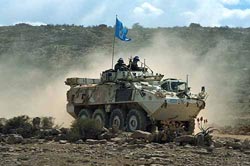
UN SECURITY COUNCIL’S HANDLING OF ABKHAZIA: A DISQUIETING PRELUDE TO BUSH-PUTIN SUMMIT
Publication: Eurasia Daily Monitor Volume: 2 Issue: 21
By:

On January 28, the UN Security Council (UNSC) voted to approve a routine six-month extension of the UNOMIG (UN Observer Mission in Georgia) mandate to observe the ceasefire in Abkhazia. The UNSC had finalized the wording of the relevant resolution at a closed-door meeting on January 26. The Georgian delegation, which supported the mandate’s extension, was excluded from that meeting, so as to make it easier to disregard Georgian proposals on the resolution’s wording. Russia opposed Georgia’s attendance and proposals on the wording, and the other UNSC members — including the United States — bowed to Russia without any audible murmur.
Georgia’s Permanent Representative to the United Nations, Revaz Adamia, had submitted those proposals in writing, also requesting that Georgia “as the country on whose territory the conflict takes place” be admitted to the decisive January 26 meeting as a matter of course. When this failed to happen, Adamia circulated those proposals as a letter to the UNSC president through the UN system, and called a news conference to publicize Georgia’s disregarded views. Both moves remained confined within the UN’s walls, even though the institution is proving unable to face the fundamental issues of international law and order that Tbilisi raised.
The letter to the UNSC and the press release make the following salient points:
— Lack of transparency at the UN is a factor blocking progress toward conflict resolution. “What is the reason for such non-transparency? This is not the first time that the UNSC has chosen such a nontransparent way [and] not the first time that the Russian Federation is preventing Georgia from speaking at UNSC meetings. Why? Is the Georgian ambassador so dangerous to Russia?”
— The United Nations, and the international community generally, are turning a blind eye to Russia’s de facto annexation of Abkhazia through: extending Russian citizenship to some 80% of Abkhazia’s current population; continuing acquisitions of property and land there; encouraging Abkhaz leaders to refuse to even take delivery of the UNSC-blessed Boden document as a basis for political status negotiations; permitting the training of Abkhaz military officers for Abkhaz forces in Russia’s military schools; and permitting the demonstrative appointment of the leaders of a region of Georgia by Moscow — most recently through the Russian Federation’s deputy prosecutor-general who imposed and co-signed the agreement in Sukhumi that installed Abkhazia’s leadership.
— The UNSC’s past resolutions on Abkhazia have “become blank papers. Only the Georgian side takes them seriously, while the Abkhaz reject them, without any consequence. . . . The Geneva process [the formal UN negotiating framework on Abkhazia] is becoming just a discussion club. It is inadmissible to emasculate the Geneva process.” The UN fails not only to address the ethnic cleansing of Georgians, but even to comment on the Abkhaz leaders’ recent statements ruling out the return of most refugees and internally displaced persons.
— Russia retains the Gudauta military base in Abkhaz-controlled territory, despite its obligation to have vacated the base under international supervision in 2001. Georgia, as the legal sovereign, has repeatedly proposed that the base be handed over to UNOMIG, thus inviting the UN to participate in the fulfillment of the 1999 OSCE summit agreement on the issue. However, Russia refuses, and the UN is constantly delaying a decision on the matter.
— The all-Russian “CIS peacekeeping troops” in Abkhazia support the Abkhaz forces and provide cover for Abkhaz paramilitaries in threatening and abducting Georgian civilians in the Gali district, most recently during the Abkhaz “presidential election” campaign. Georgia requests the UNSC to condemn such actions and to urge the “CIS PKF” to oppose them. Moreover, it is “high time [for the UN] to start thinking of a new peacekeeping format, as the CIS PKF can hardly be considered as ‘peacekeeping’.”
None of those Georgian concerns were taken into account at these UNSC meetings. UNOMIG is, in practice, a bystander in Abkhazia, with a constricting mandate, and dependent on Russian “peacekeeping” forces for its own security and movements. Although UNOMIG decides very little in Abkhazia, the periodic renewal of its mandate had at least provided an occasion for Georgia and its friends to raise issues of concern at the UNSC. This seems to be no longer the case, as Georgia is ruled out of meetings, and her proposals are ruled out of the adopted resolution.
The U.S. State Department apparently deferred to Russia in this situation. It also deferred to Moscow at the OSCE this month by initiating a proposal to “review the effectiveness” of the OSCE’s Georgia Border Monitoring Operation, which Russia had killed with the argument that it is “ineffective.” The “review” proposal would have been timely many months ago, when Russia was officially warning that it would take that action. By now, the “review” proposal appears designed as a cover for taking no concrete action and leaving Georgia to face Russia one-on-one on that border. Such signals can encourage Moscow to conclude that the United States is not prepared to raise issues of vital concern to a democratic and loyal member of the U.S.-led coalition in the run-up to the George W. Bush-Vladimir Putin summit scheduled for late February.
(Documents of UNSC meetings, January 26, 28).




